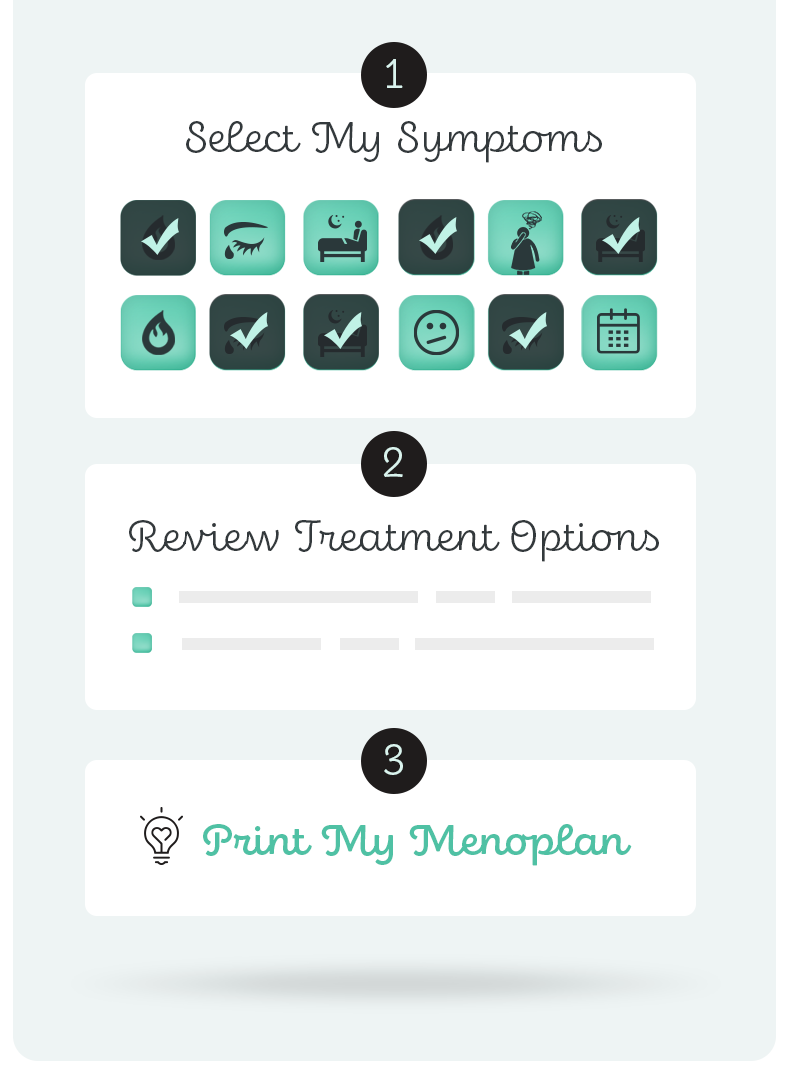About
MENOPAUSE MYTHS
There are many myths and “old wives tales” about menopause that have been passed down through the ages. But researchers have been working hard for the last 30 years to better understand this important reproductive stage, the symptoms, and what helps when symptoms are bothersome. We describe some of these myths and what research has shown.
There are other effective treatments for menopause symptoms. Look up your symptoms and see what works.
You may have heard of “change of life” babies. You cannot be confident that you will not get pregnant until you have gone a full year without a menstrual period – and even then it is not 100%! Until then you should use birth control if you do not want to get pregnant. Because periods can become irregular during perimenopause, methods that rely on the timing of your periods may be less reliable.
We live in a culture that emphasizes youth. Menopause has been a taboo topic, and it’s time to change that. The truth is that once they get through the menopause transition, and their symptoms subside, many women find that their lives are better than ever. Children may be out of the house. No more worries about pregnancy, so sex may be better. No more periods, cramping, and surprise bleeding! The postmenopausal time can be an exciting time of high energy, discovery and personal focus.
For some women vaginal dryness and pain with sexual activity are real problems. But this is far from universal, and there are things you can do to help. For some women not worrying about pregnancy gives their sex life a boost and once night sweats improve, body image improves.
Hot flashes ARE real. There are measurable physiologic changes that happen during a hot flash. See this YouTube video by our MsFLASH colleague Dr. Janet Carpenter who records what hot flashes look like.
There is a great deal of debate and confusion about this topic. There have been many studies of dozens of different herbal products and supplements. Some are promising, but overall, the evidence that these products work is not convincing. This is discussed on our page on herbs and supplements.
Menopause can begin before age 40. This is called premature menopause. Read more about premature menopause.
While the most typical pattern is for women to experience symptoms as their periods change, this isn’t always the case. Some women do start to have hot flashes and other menopause symptoms before they notice changes in their menstrual cycles. And some women don’t have symptoms until their periods stop.
Bioidentical hormones are hormones that are similar to the hormones made by the body. In females, the major reproductive hormones are estradiol, progesterone and testosterone. There is a great deal of misinformation about bioidentical hormones. Many of the hormones made by pharmaceutical companies and approved by the FDA are bioidentical. Some women obtain bioidentical hormones from compounding pharmacies. There is concern about compounding pharmacies because there is less quality control for compounded drugs than for drugs made by pharmaceutical companies that are regulated by the FDA.
Another source of misinformation concerns “natural” hormones – for example those made from plant products. These plants are a base for making the majority of hormonal medications. But the hormones don’t come from the plants. They have to be made in a laboratory. There is no evidence that natural hormones or bioidentical hormones are safer than estrogen and progesterone medications not made using a plant base.
Many women gain weight as they age. Researchers have tried to figure out how much weight gain is due to the menopause transition, and how much is due to aging. But evidence is scant. We discuss this topic in our section on weight gain.
We all wish this was true, and some women have very few or no symptoms. But for most women symptoms last for many years.
A large U.S. study followed women through the menopause transition and postmenopause. In that study, the median total duration of frequent or moderate to severe hot flashes/night sweats was 7.4 years (this means that for half of women hot flashes lasted less than 7.4 years and for half they lasted longer than 7.4 years). The median duration after the last menstrual period was 4.5 years.
For women who were premenopausal or in the early perimenopause when they started having hot flashes, the median was greater than 11.8 years and they continued for a median of 9.4 years after the last menstrual period.
The median duration varies by race/ethnicity. The longest duration is in African-American women (10.9 years) followed by Japanese women (9.4 years), non-Hispanic white women (0.1 years), Chinese women (5.5 years) and Hispanic women (9.4 years).
There are many things others can do to help women who are having menopause symptoms. The key is communication.
Because men do not have this transition (or at least have a more gradual hormonal transition and do not recognize the changes they are experiencing), it may be challenging for them to understand. Being open, sharing what is going on and what you need may go a long way to help. Tell your partner what you are feeling. Discuss why you may need the thermostat set lower or higher. Tell them why you need lighter covers on the bed, or different electric blanket controls. Your partner can’t know what you need unless you tell them. Don’t expect them to read your mind or just “get it”. By talking with your partner you can let them know how to help. One women’s husband had a sweet way to help her cool down when he noticed her flashing: “My husband knows that when I’m red in the face to bring me an ice cube or to place his cold fingers on my neck.”
The same is true of your family. Make your family a partner in the journey.
An early study suggested that slow deep breathing, or paced breathing, might help. Unfortunately, later studies found that slow deep breathing does not relieve hot flashes but can calm anxiety associated with a hot flash.
Estrogen and other hormonal and nonhormonal therapies usually decrease the number and intensity of hot flashes. But estrogen and other treatments usually do not completely eliminate them. Higher estrogen doses may completely eliminate symptoms but are not safe.



